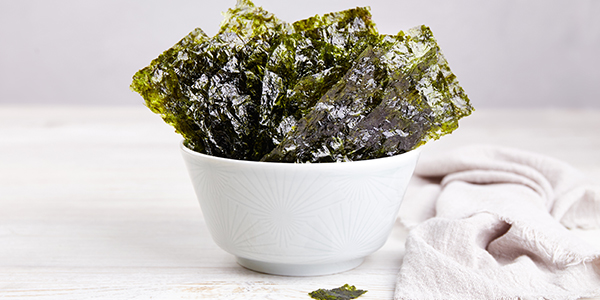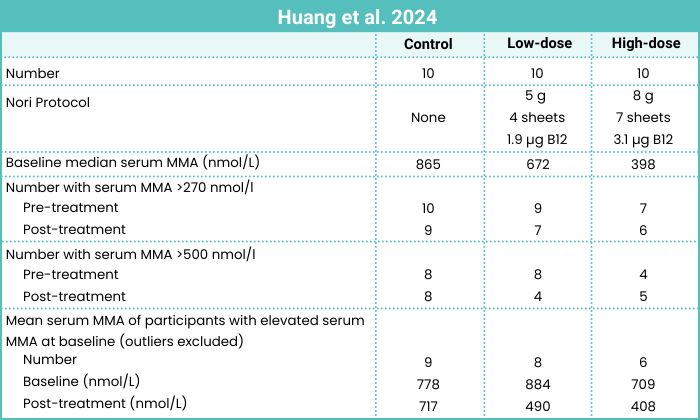
by Jack Norris, RD
A new study has examined the effect of eating nori on vitamin B12 status of vegetarians. Below is an excerpt from our larger article, Vitamin B12 in Plant Foods.
Huang et al. (2024, Taiwan) studied the effect of nori on the B12 status of 24 vegetarians and 6 vegans in a 4-week long trial.
The type of nori used was roasted purple laver (Neopyropia sp., formerly Porphyra sp.). The researchers surveyed the vitamin B12 content of the same brand of nori purchased on different dates and found that the B12 content ranged from 23.1 to 52.8 µg/100 g dry weight. This amount of B12 is similar to that found in purple laver in other studies.
Participants were randomized to three groups: control, low-dose nori, and high-dose nori (as described in the table below).
The authors provide a spreadsheet of all the individual participants’ data in their Supplementary Material 3. I sorted the data by treatment group in the Huang 2024 Individuals tab of our spreadsheet, B12 in Plant Foods.
Serum methylmalonic acid (MMA) increases during vitamin B12 deficiency and a change in serum MMA is the most reliable way to determine the B12 activity of a food or supplement. The table below shows that after treatment, serum MMA normalized to ≤ 270 nmol/L in only 4 participants. For such a short trial, reducing MMA to a normal level in most participants might be too much to expect.
Based on a rough correlation between serum MMA levels and clinical symptoms, as discussed in Appendix A. Minimizing Methylmalonic Acid Levels, I did an analysis on Huang et al.’s data using a cutoff for a harmful level of serum MMA of 500 nmol/L. Low-dose nori resulted in 4 of 8 participants reducing their MMA to below 500 nmol/L which seems like an impressive result.
In contrast, high-dose nori resulted in a net increase from 4 to 5 participants with an MMA level >500 nmol/L. There were two participants in the high-dose group whose MMA levels went from healthy to not healthy (306 to 569 and 222 to 819 nmol/L). These participants’ other B12-related parameters didn’t change enough to suggest an obvious decrease in kidney function which is my best guess for what could have caused a substantial increase in MMA levels. The authors didn’t address these two individuals.
There appeared to be no benefit to eating the high-dose amount of nori. This could be due to the saturation of intrinsic factor that occurs with a single dose, although the amount of B12 in the low-dose protocol (1.9 µg) doesn’t seem like enough to saturate intrinsic factor; I would have thought the high-dose protocol would have provided additional benefits.
While I’m surprised at how impressive these results are for many of the participants, there are enough inconsistencies that I can’t yet feel comfortable recommending nori as a reliable source of B12 for vegans. I also would feel more comfortable with a study performed using only strict vegans taking no other sources of B12 for the duration of the study.
In summary, it seems possible that dried, purple laver nori (Neopyropia sp., formerly Porphyra sp.) can significantly contribute to improving B12 status for many vegetarians and vegans, but more research is needed before it can be recommended as a sole, reliable source of B12.






One thought on “Nori Lowers Serum MMA Levels among Vegetarians”
Also, we need to be aware that continuing to eat these huge amounts of nori is expensive, usually, 1pack nori in Taiwan is 25g. cost TWD99(USD 3), it’s not a friendly price, in my opinion… thanks for your article. I read your works for years and learned a lot, So…I still would rather choose more reliable, affordable, and already have lots of RCT to prove is working for vegans, such as supplements.